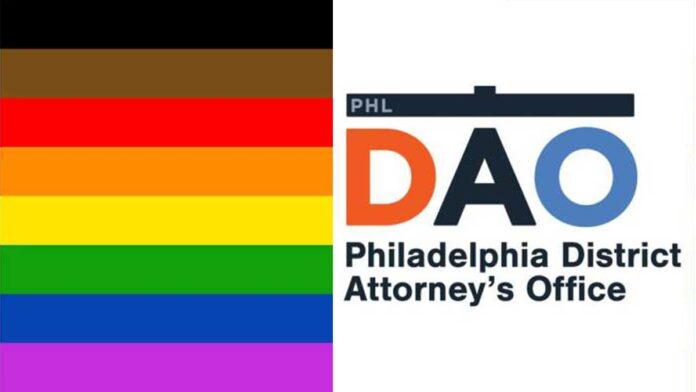In an effort to provide better resources to victims and defendants, staff members in Philadelphia’s District Attorney’s Office (DAO) Victim Services unit have been using an LGBTQ+ arrest identification sheet to pinpoint crimes in the queer community.
Since the Victim Services team began using the tracking system in November, 2020, it has helped them accurately identify 53 arrests that involve members of the LGBTQ community. Those 53 arrests generated 54 Municipal Court cases, 81% of which are domestic violence cases, said Kelly Burkhardt, DAO LGBTQ+ liaison and victim services coordinator. At 37%, aggravated assault is the most common lead charge of those cases.
“What it really speaks to is a lot of people’s anxieties, frustrations, not being able to handle their anger, various things with communication,” Burkhardt said.
DAO Senior Data Analyst Tyler Tran played a main role in devising the arrest identification sheet. Each night the tracking tool searches through the arrests that were made the previous day, “looking for” designated keywords like “gay,” “lesbian,” “transgender” and others. If any of the keywords appear, the tool emails Burkhardt, Tran, and another DAO staffer.
The tracking tool has helped pinpoint LGBTQ-related crimes with about 55% accuracy, Burkhardt and Tran said. That percentage is due in part to words that sometimes trigger the sheet that have nothing to do with a person’s sexual orientation or gender. Out of that 55%, Burkhardt is working on 58 active cases, 10 of which are non-fatal shooting cases and 27 of which are domestic violence cases. But the 55% accuracy makes it difficult to gauge trends in LGBTQ-related crimes.
“We don’t know what the spreadsheet isn’t picking up on, we don’t know what it’s missing,” Tran said. “We can say that 75% of our alerts have been for domestic violence, that doesn’t necessarily mean that 75% of the incidents that involve the queer community are domestic violence.”
Regardless of the exact percentages, however, the number of recent domestic violence cases has led Burkhardt to consult the DA’s LGBTQ+ Advisory Committee to get feedback about finding more robust resources where she can direct victims of domestic violence and intimate partner violence.
“We absolutely need more [resources],” Burkhardt said. She cited WOAR – Philadelphia Center Against Sexual Violence and Women Against Abuse as useful organizations with LGBTQ programs.
“[In Philadelphia] We lack adequate services that are centralized and capable of having capacity to support us mentally, to do early intervention strategies, to actually give us a way out,” said Sappho Reynan Fulton, MA, MSW, who sits on the LGBTQ+ Advisory Committee. She works as clinical director with the organization Why Not Prosper, runs a private psychology practice, and serves as CEO of the nonprofit Sappho and LaRoyce Foundation, where she works to eradicate domestic violence involving QTBIPOC folks.
Fulton described the process of getting support in instances of domestic violence as disruptive and retraumatizing — calling 911, leaving the house, filing a restraining order against the person who did the abusing, who is also typically somebody who the victim loves, and then figuring out where to go from there.
“Most likely, 100% of the time, our trans folks don’t have anywhere else to go,” Fulton said. “Right now the main thing I see we need over anything is a location where our trans woman and men [who are experiencing DV] can have somewhere to go.” She pointed out that there are no resources in Philadelphia for trans men with children, who, like trans women, also experience high rates of domestic violence.
As for solutions, “we have to reinvent the ask and the why,” Fulton said. “What are we looking for, why do we need this and how do we need it developed? We really have to strategically look at a long term stay, how can this exist long term. Trans folks barely have jobs, most of them have social security, they don’t have an income to pay their own rent. So we need funding for a general operation to function.”
Although the arrest ID sheet doesn’t reflect an elevation in gun violence among LGBTQ communities in Philly, “that’s certainly there too,” Burkhardt said. She brought up a trans man who was non-fatally shot just over a month ago, who previously suffered a nonfatal gunshot wound and experiences post-traumatic stress disorder.
“What happens with a lot of people with crime, from what I gather, you deal with your own personal safety — ‘do I have a roof, do I have a place to live, is someone going to roll up on me,’” Burkhardt said. “It seems to be always about the physical because when you go into trauma, you go into that thing of fight, flight or freeze. It’s everything about life or death.”
The rates of gun violence in Philly reflect the national discourse around violence towards trans people, especially trans people of color, Burkhardt pointed out.
A further roadblock in identifying LGBTQ-related crimes: the initial police reports that Burkhardt receives do not always contain information about the victim’s sexual orientation or gender identity. She said that she has been speaking with Sergeant Nick Tees, LGBTQ liaison for the Philadelphia Police Department, about asking PPD officers to identify victim’s sexual orientation and/or gender when writing reports.
Another method of facilitating the ability to track down LGBTQ-related crimes lies in community members getting in touch with the Victim Services unit. “The old school method of, they would call Deja Alvarez [co-chair of the Philadelphia Police LGBTQ Liaison Committee], Deja calls me, I would reach out to our attorneys or our charging unit to see what’s going on with these cases,” Burkhardt said.
Tran echoed Burkhardt’s sentiment, explaining that the tracking tool does not take the place of building community partnerships.
“I think hopefully it’s helped some, but not all problems are technology problems, and not all solutions are going to be technological,” he said. “Hopefully the two ways we’ve been doing this can work well together.”

